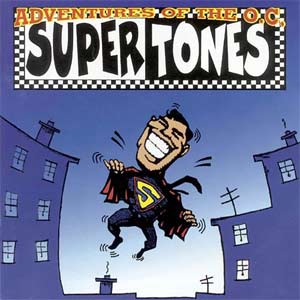Related Research Articles
The Christian music industry is one aspect of the broader music industry, with a focus on Christian music and subgenres such as gospel music, southern gospel, contemporary Christian music, contemporary worship music, and even traditional church music. It is sometimes called the gospel music industry, a narrower term that does not encompass all the musical genres included here.

Five Iron Frenzy is an American band formed in Denver, Colorado, in 1995. Best known for playing ska punk music characterized by an offbeat sense of humor and prominent Christian themes, Five Iron was one of the pioneering figures of the Christian ska movement which emerged with ska's mainstream revival in the 1990s. Since 2000, the band's music has shifted away from straight ska to include and embrace stronger alternative rock and pop punk influences, though it continues to create ska music and feature Christian overtones despite several members' changes in religious beliefs.
The Insyderz were an American Christian ska-punk band from Detroit, Michigan. They formed in 1996 and disbanded in 2005. The band reformed in 2009, but have not been actively playing shows in the last few years. The Insyderz are one of the "big three" bands which represented the Christian ska scene, alongside the Supertones and Five Iron Frenzy.

The Orange County Supertones were a Christian ska band from Orange County, California. The band was signed to Tooth & Nail Records and its imprint, BEC Recordings, before becoming an independent band. The band temporarily disbanded in 2005, though reunited in 2010 to resume touring and recording before permanently disbanding in 2017. The OC Supertones were one of the first widely successful Christian ska bands.

Adventures of the O.C. Supertones is the first album released by The O.C. Supertones. Its lyrical content is mostly simple and spiritual, similar to worship music. Cornerstone reviewer Don Hill stated that its simplicity was similar to that of the song "Father Abraham", designed to "draw you out of yourself and into the presence of God like a small child." Some exceptions are "Blood Washed Pilgrim" which contains direct theology, and "Found" which references Saul's conversion to explain the purpose of the band. In the words of the band this is "Preach the Gospel, reach your heart, and ska, ska, ska, ska!" "OC Supertones" continues the explanations, stating their stance on the church and some of the band's background. Musically the album contains simple guitar supported by horns, with splashes of reggae, alternative rock, and rap. The latter elements would become more prevalent later in the band's later releases. The album's first track, in its intro, features a distinct similarity to Metallica's version of the Diamond Head (band) track Am I Evil? released on their 1980 debut album Lightning to the Nations

Michael Reese Roper is an American singer-songwriter, best known as lead singer for the Denver, Colorado-based Christian ska punk band Five Iron Frenzy, as well as fronting the rock bands Brave Saint Saturn and Roper.

Hi-Fi Revival is the sixth studio album released by The O.C. Supertones. It was the first of three sessions the Supertones recorded in Franklin, Tennessee at Dark Horse Studios. Matt Morginsky and Ethan Luck lived together at this time and demoed over 50 songs for Hi-Fi Revival in their basement. 17 of the un-used songs made it on to their side-project album, Grand Incredible. The rest of the demos were never released. CCM characterized the sound on this album as displaying stripped down ska core rhythms, with the horn section now "providing color instead of the dominant sound."

The W's were a Christian ska and swing revival band, formed in Corvallis, Oregon in 1996. Success came quickly to the band and their first album, Fourth from the Last, was a sleeper hit, unexpectedly having had the strongest debut of any Christian album to date for its distributor. They toured the United States several times with a variety of artists. Touring highlights include Pope John Paul II's 1999 visit to St. Louis and dc Talk's Supernatural support tour.
Sonicflood is an American contemporary worship music band from Nashville, Tennessee, that has been touted as "The Fathers of the Modern Worship Movement." The group took the name "Sonicflood", a reference to a line in the Book of Revelation, chapter 19, verse 6.

5 Minute Walk was an independent record label founded by Frank Tate in April 1995. Operations were based in Concord, California in the back offices of The Screem, a music club operated by Tate. They only carried Christian bands and considered themselves to be a Christian ministry. Most records were produced by Masaki Liu at Masaki's One Way Studio and executive produced by Frank Tate.
One Bad Pig is a Christian punk and metal crossover band from Austin, Texas, which formed in 1985. The Encyclopedia of Contemporary Christian Music describes them as "quite possibly the most popular hard-punk act ever to arise within the Christian music scene." They were known for their mischief and irreverence on stage, as reflected even in their reunion at Cornerstone in 2000.

DigHayZoose was a Christian funk and modern rock band from Kansas City, Missouri. The Encyclopedia of Contemporary Christian Music describes them as "One of the first Christian alternative rock bands of the 1990s". Their name, when spoken, is audibly similar to saying "Dig Jesus" in Spanish.

Blonde Vinyl was an independent record label founded in 1990 by Michael Knott. The Encyclopedia of Contemporary Christian Music describes the label as "one of Christian music's first true indie labels."
Squad Five-O is an American punk rock band from Savannah, Georgia no longer formally touring or recording, but rather only performing occasional weekend concerts. Like their initial ska-punk stylings, their name was derived from a cross between the television shows Hawaii Five-O and The Mod Squad. Between 1997 and 2006 the band grew lyrically and in popularity, and also shifted its style significantly. Over the course of their career they moved from a small indie Christian label to the major label Capitol Records and released five albums in the process.
Idle Cure was an arena rock band from Long Beach, California. The Encyclopedia of Contemporary Christian Music calls their sound "the best example of cloning a sound for Christian markets", likening it to that of Def Leppard's Pyromania. They targeted a youthful audience, distinguished by overtly evangelical religious lyrics.
Mortal was a Christian industrial/dance band fronted by Jerome Fontamillas and Jyro Xhan. Both members went on to found the alternative rock group Fold Zandura, and for a time were members of both bands simultaneously. The band is known for its lyrical intelligence, incorporating advanced theology with what has been billed as "Industrial Praise and Worship." According to CCM Magazine "Mortal has had a much greater influence... on industrial music than its modest output would suggest."

A Christian music festival is a music festival held by the Christian community, in support of performers of Christian music. The festivals are characterized by more than just music; many feature motivational speakers and evangelists, and include seminars on Christian spiritual and missions topics, service, and evangelism. They are often viewed as evangelical tools, and small festivals can draw 10 times the crowd of traditional revival meetings. While the central theme of a Christian festival is Jesus Christ, the core appeal of a Christian music festival remains the artists and their music. Critics point out that the dichotomy of business and religious interests can be problematic for Christian festivals. In similar ways as the Christian music industry in general, festivals can be drawn away from their central theme and gravitate toward commercialization and mainstream acts in an attempt to draw crowds.
Christian ska is a form of Christian alternative rock, and subgenre of ska and ska punk which is lyrically oriented toward contemporary Christian music. Though ska did not constitute a genre within the Christian music industry until after third wave ska had peaked in the general market, Christian ska continued to thrive independently into the early 2000s.
References
- ↑ Urbanski, David (July 1997). "One Crazy Summer". CCM Magazine . 20 (1): 24–32. ISSN 1524-7848.
- ↑ Gulla, Bob (2006). The Greenwood Encyclopedia of Rock History, Volume Six. Westport, Connecticut: Greenwood Press. p. 47. ISBN 0-313-32981-8.
- ↑ Bonham, Chad (January 1997). "Talent Pool: A Modern Rock Romance [The Supertones]". CCM Magazine . 19 (7): 60. ISSN 1524-7848.
- ↑ Powell, Mark Allan (2002). Encyclopedia of Contemporary Christian Music (First printing ed.). Peabody, Massachusetts: Hendrickson Publishers. p. 13. ISBN 1-56563-679-1.
What I propose is that we define contemporary Christian music exactly the same way we define all other genres. Such labels are always audience-driven and are based unapologetically on perception, not content or intent. If I were writing a book on punk rock, I would find out what people who call themselves fans of punk rock like to listen to.
